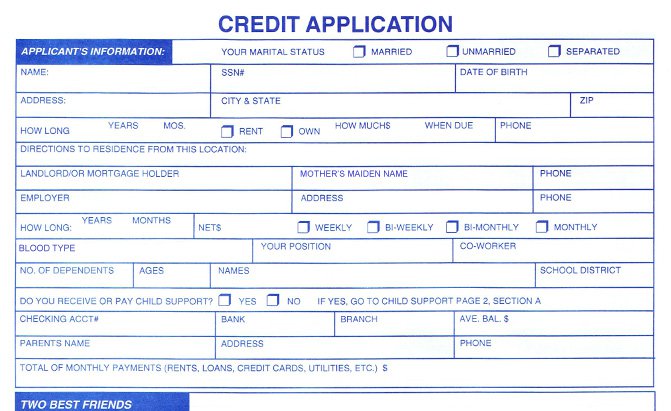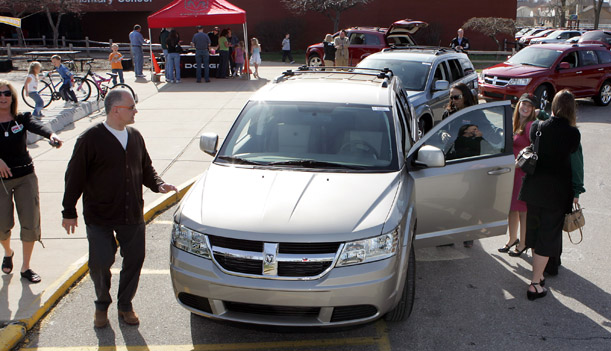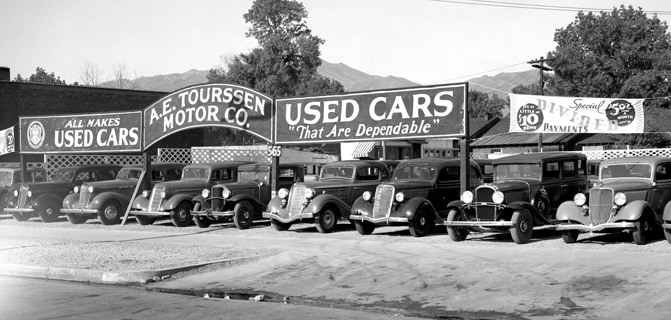You probably loathe car salespeople. Most of us do and in many instances they probably deserve their sullied reputation.
These sometimes unscrupulous folks can be manipulative, pushy and downright dishonest in their dealings. We already walked you through the car-buying process but here’s what can really go on in a dealership’s shadows as one former metal mover opens up about his experiences in the business.
“If you don’t smoke as a car salesman you’re picking up a bad habit when you’re there,” said Josh Lewis, a one-time vehicle peddler at a combined Mazda/Kia dealership in North Carolina. With long hours and demanding supervisors “It was a high-stress job,” he said and a position that can lead to all forms of substance abuse, both legal and, well, not.
SEE ALSO: Tips From a Salesman on How to Buy a Car
Like big game hunters, salespeople start sizing customers up like wounded prey long before they ever limp across the showroom floor. “We judge the hell out of people,” said Lewis though, “If you look clean, if you look bright, we’ll chit-chat.” A little small talk before business can put both parties at ease.
Not surprisingly a dealership’s defensive perimeter extends far beyond the building itself. “If they [the customer] got in the door someone outside didn’t do their job,” said Lewis.
When a person walks in he said the salespeople tussle with one another to get a crack at the potential buyer. “Basically when they [shoppers] come up to the lot you do everything in your power to get their attention,” he said adding, “You have to be as polite as possible but you have to be assertive to make them want to come with you.”

Once a potential customer has been set up with a salesperson Lewis said the next step is often to fill out a long, boring form that covers things like income, home address, credit scores and much more. This helps determine how much the person can spend and what kind of financing they’re eligible for. Once the dealer knows a little about a driver’s monetary situation the salesperson can help guide them to the appropriate vehicle, whether it’s best for them or the dealership is another matter.
“I’d say probably 60 percent [of people] walk on the lot looking for a certain car or expecting to get a certain car and then actually end up leaving with something else, or nothing,” said Lewis, adding that there are several reasons why this can happen. “Sometimes the bank won’t buy them,” industry terminology for getting a loan, but there are sleazier explanations why sales don’t go through. “Sometimes it’s ‘this car is not going to make enough profit,’” he said. Managers will shoot things down if it’s not advantageous enough to their bottom line.
“Nine times out of 10 I knew if someone could buy something or not before I actually let them test drive a car,” said Lewis. And appropriately, “If I knew that they couldn’t buy it was my job to get them to exhaust every resource to get a cosigner,” be it a parent, a sibling or a friend, anything to make the deal work. “This was my job, this is what I had to do.”

And salespeople have many tactics to get you to buy something. Cars are some of the most emotional products in the world; there’s a lot of passion surrounding the automobile, even something as humble as a Toyota Corolla. Lewis said, “My job is to make them love something, fall in love,” even if it’s not the model they were originally interested in.
After financial formalities have been taken care of Lewis said it’s time to, “Let ‘em out of their cage” and go for a ride. “During the test drive you’re basically masking anything bad [about the vehicle] with lots of good praise,” he said. Giving an example he described a Dodge Stratus’ lackluster suspension as “sport tuned.” You get the idea …
SEE ALSO: What to do After a Crash
And of course during the road test you pray the buyer is a safe driver. Lewis said you “[hope] to God that they don’t have to do an emergency maneuver,” anything that would imperil your lives.
As Lewis mentioned, if you don’t already have a bad habit as a salesperson you soon will, and apparently the same is true for customers. Recounting one of his most memorable test drives, he was forced to go for a spin with a woman that was clearly intoxicated. He said he notified his manager of the situation but the boss was having none of it, demanding that Lewis take her out. Fortunately common sense prevailed and he drove the car, though you’ve got to wonder how you can get a feel for the way something drives by sitting in the passenger seat.

Ideally after the all-important test drive the customer pulls back into the lot and is encouraged to park in front of the dealer; this is a carefully calculated move so the vehicle is visible from inside. Then, “You pull them back into the office, set the keys in front of them on the desk,” said Lewis. “They’re just amped up and excited.” And then the emotional pitch begins. “You start to go Dr. Phil on them. You get preachy.”
“You’d sell them on the fact that this is what they belong in,” he said, masking their insecurities about money or a potentially bad deal in the process by saying things they want to hear. “You’ve worked hard in your life, you deserve this,” he said, really sucking up to the customer and tightening the emotional screws. And of course “everything is today,” said Lewis, which builds a sense of urgency.
And if the customer likes things so far and the salesperson is lucky the deal might close, provided the dealership manager approves. Lewis said sometimes things go lickety-split and other times it drags on with offers, counter offers, credit checks and hunting for a cosigner, something that can be akin to searching for the Ark of the Covenant. On several occasions he said it took him six hours to seal a deal; one even drug on for eight!
And after an ordeal like that a buyer is probably ready to run for the door but they’re not done yet. They still have to survive a trip through the financing meat grinder. Lewis said be on guard during this portion of the sales process, which is just another way for a dealer to profit from you. “Finance guys are trained to milk money,” he said. “They don’t even have to be very good at math.” Watch out.
“If you sell someone a vehicle at way over the actual price ‘you knocked them over the head,’” said Lewis, recounting a story about how one of his colleagues sold a used Chrysler minivan for waaaaay more than what it was worth AND was able to get away with charging the customer a hefty premium for the removable rear seats, which should have been included. Perhaps it’s best to wear a helmet when looking for a new ride, or better yet do some research on AutoGuide.com.

Still, Lewis hasn’t sold cars for quite a few years and he said stuff probably isn’t as bad as it used to be. “I think the process now has evolved and become better. Most new-car dealers have gotten better … [but] used-car lots are still on the shitty list for me.” Lewis also said if you’re shopping at a big-name dealership group the salespeople can’t rush you through the process or horse you around too much. “If they [customers] call the manager or leave a voicemail for the owner you’re screwed.”
SEE ALSO: What does a VIN do?
He may not be in the business anymore but Lewis still enjoyed his tenure as a car salesman. “I actually loved it, but it was the worst love I could have.” He likened the experience to being in a really bad relationship. “You wanted to strangle this person everyday but the sex was amazing.”
So yes, dealerships can be every bit as sleazy as you might have expected, at least from one salesman’s point of view. Fortunately things have probably gotten better, especially if you’re shopping at a larger, well-known store.
Want more stories like this? Check out our Tips and Advice section.



Leave a Reply